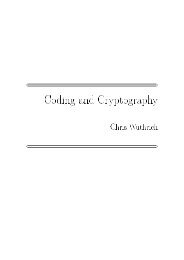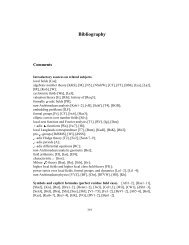ENTANGLEMENT OF GAUSSIAN STATES Gerardo Adesso
ENTANGLEMENT OF GAUSSIAN STATES Gerardo Adesso
ENTANGLEMENT OF GAUSSIAN STATES Gerardo Adesso
You also want an ePaper? Increase the reach of your titles
YUMPU automatically turns print PDFs into web optimized ePapers that Google loves.
138 7. Tripartite entanglement in three-mode Gaussian states<br />
The notion of “promiscuity” basically means that bipartite and genuine multipartite<br />
(in this case tripartite) entanglement are increasing functions of each other,<br />
while typically in low-dimensional systems like qubits only the opposite behavior<br />
is compatible with monogamy (see Sec. 1.4). The promiscuity of entanglement in<br />
three-mode GHZ/W states is, however, partial. Namely they exhibit, with increasing<br />
squeezing, unlimited tripartite entanglement (diverging in the limit a → ∞)<br />
and nonzero, accordingly increasing bipartite entanglement between any two modes,<br />
which nevertheless stays finite even for infinite squeezing. Precisely, from Eq. (7.40),<br />
it saturates to the value<br />
G i|j<br />
τ (σ GHZ/W<br />
s , a → ∞) = log2 3<br />
≈ 0.3 . (7.45)<br />
4<br />
We will show in the next Chapter that in CV systems with more than three modes,<br />
entanglement can be distributed in an infinitely promiscuous way.<br />
More remarks are in order concerning the tripartite case. The structure of<br />
entanglement in GHZ/W states is such that, while being maximally three-party<br />
entangled, they are also maximally robust against the loss of one of the modes.<br />
This preselects GHZ/W states also as optimal candidates for carrying quantum information<br />
through a lossy channel, being intrinsically less sensitive to decoherence<br />
effects. In the next Section, we will exactly analyze the effect of environmental decoherence<br />
on three-mode Gaussian states and the sharing structure of noisy GHZ/W<br />
states, investigating the persistency of a promiscuous structure in the presence of<br />
thermal noise. The usefulness of GHZ/W states for CV quantum communication<br />
will be analyzed in Sec. 12.2.<br />
As an additional comment, let us mention that, quite naturally, not all threemode<br />
Gaussian states (in particular nonsymmetric states) are expected to exhibit<br />
a promiscuous entanglement sharing. We will provide in Sec. 7.4.3 an example of<br />
three-mode states with not so strong symmetry constraints, where the entanglement<br />
sharing structure is more traditional, i.e. with bipartite and tripartite quantum<br />
correlations being mutually competitors.<br />
7.4. Promiscuous entanglement versus noise and asymmetry<br />
7.4.1. Decoherence of three-mode states and decay of tripartite entanglement<br />
Here we analyze, following Ref. [GA11], the action of decoherence on tripartite entangled<br />
Gaussian states, studying the decay of the residual contangle. The GHZ/W<br />
states of Sec. 7.3.1 are shown to be maximally robust against decoherence effects.<br />
7.4.1.1. Basics of decoherence theory for Gaussian states. Among their many special<br />
features, Gaussian states allow remarkably for a straightforward, analytical treatment<br />
of decoherence, accounting for the most common situations encountered in<br />
the experimental practice (like fibre propagations or cavity decays) and even for<br />
more general, ‘exotic’ settings (like “squeezed” or common reservoirs) [212]. This<br />
agreeable feature, together with the possibility — extensively exploited in this Dissertation<br />
— of exactly computing several interesting benchmarks for such states,<br />
make Gaussian states a useful theoretical reference for investigating the effect of<br />
decoherence on the information and correlation content of quantum states.<br />
In this Section, we will explicitly show how the decoherence of three-mode<br />
Gaussian states may be exactly studied for any finite temperature, focusing on the







